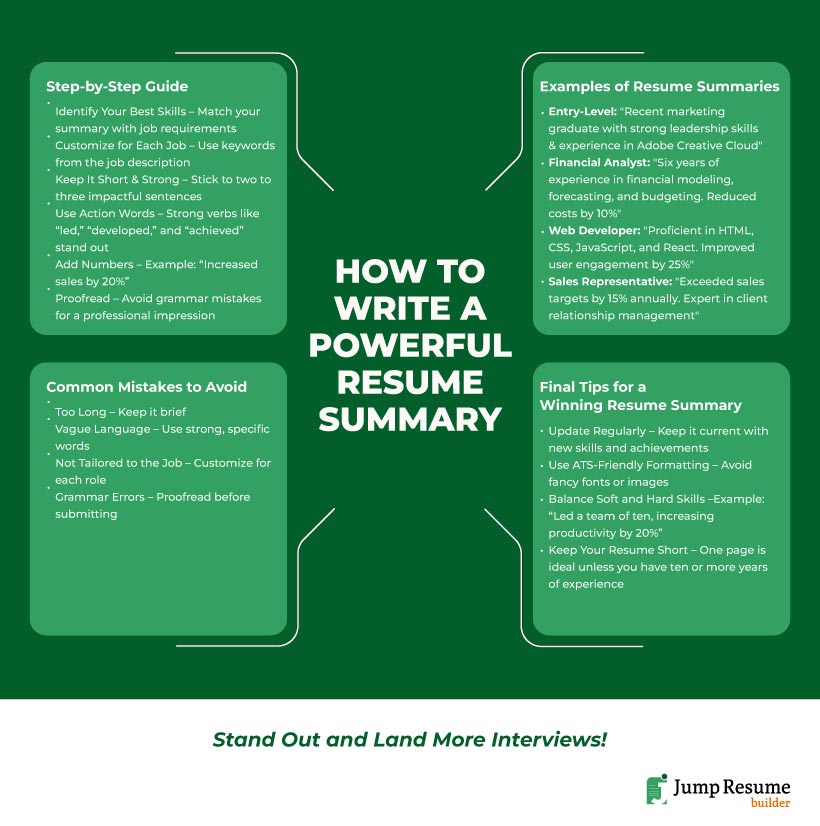- How It Helps Employers
- What is a Resume Summary?
- Why Do You Need a Resume Summary?
- Highlights Key Skills
- Matches Job Descriptions
- How to Write a Resume Summary (Step by Step)
- Identify Your Best Skills
- Customize for Each Job
- Keep It Short and Strong
- Use Action Words
- Add Numbers When Possible
- Proofread Before Submitting
- Resume Summary Examples for Different Jobs
- Entry-Level Example
- Recent Marketing Graduate
- Administrative Assistant Example
- Organized Administrative Professional
- Sales Representative Example
- Dynamic Sales Representative
- Web Developer Example
- Creative Web Developer
- Marketing Manager Example
- Strategic Marketing Manager
- Financial Analyst Example
- Analytical Financial Analyst
- Common Mistakes to Avoid
- Using Weak or Vague Words
- Not Tailoring It to the Job
- Forgetting to Check for Errors
- Final Tips for Writing the Perfect Resume Summary
- FAQs
- What is the ideal length of a resume summary?
- Can I use the same resume summary for multiple jobs?
- How do I know if my resume summary is effective?
- Should I include soft skills in my resume summary?
- How long should my resume be?
- Should I list my entire career history?
- What do I do if I have a gap in employment?
- What skills should I list on my resume?
A strong resume summary is the key to grabbing the attention of recruiters and setting yourself apart in a competitive job market.
A resume summary is a short section at the top of your resume that quickly highlights your skills, experience, and strengths in just a few sentences. Since recruiters spend only a few seconds scanning each resume, a well-written summary is essential for making a quick and lasting impression.
It helps them decide if you are the right fit for the job, increasing your chances of moving forward in the hiring process.
How It Helps Employers
When hiring managers receive hundreds of applications, they do not have time to read every detail. Because of this, a clear and strong resume summary makes their job easier. It quickly highlights your best qualifications, allowing them to see your value right away.
As a result, you have a better chance of getting noticed.
In this blog, you will learn how to write a resume summary that stands out. Specifically, we will cover:
- What is a Resume Summary? – A simple definition and why it’s important.
- Why You Need One – Key benefits for job seekers.
- How to Write It – Step-by-step instructions with useful tips.
- Examples for Different Jobs – Real-world examples for various careers.
- Common Mistakes to Avoid – Errors that can weaken your summary.
- Final Tips – How to make your resume summary clear, strong, and professional.
By the end, you will have a powerful resume summary that grabs attention and improves your job search success.
What is a Resume Summary?
A well-written resume makes your resume more effective.
Since recruiters only spend a few seconds on each resume, it helps them find key details quickly. As a result, your application stands out. In addition, using job-related keywords improves your chances of passing Applicant Tracking Systems (ATS).
These systems scan resumes for important terms.
If your summary includes the right words, you are more likely to get noticed. Overall, a clear and concise summary sets a professional tone. Consequently, it improves your chances of landing an interview.
Why Do You Need a Resume Summary?
Recruiters review many resumes every day.
Since recruiters don’t have time to read every detail, they focus on scanning for key information. A well-written resume summary grabs their attention and makes them want to read more. It also helps them quickly understand why you are a good fit for the job.
Highlights Key Skills
A resume summary is a short way to show your best skills and help employers understand your strengths.
A study published in Elsevier titled Skills, Signals, and Employability: An Experimental Investigation explains how showing your skills can improve your chances of getting a job. Since employers cannot always see all the skills of new job seekers, they look for signals, or clues, on resumes.
These signals, like grades, social skills, and technical knowledge, help employers decide if they want to invite someone for an interview.
The study also shows that different signals are important depending on factors such as gender, education level, and company size. For example, both men and women can benefit from showing their social skills, but women are especially rewarded for skills like IT and languages.
Also, older HR managers tend to pay less attention to school grades and more to other signals.
Matches Job Descriptions
Many companies use software to scan resumes.
These systems look for specific words from the job description. If your resume includes these keywords, you have a better chance of getting noticed. Using the right words in your summary helps your resume stand out and increases your chances of getting an interview.
How to Write a Resume Summary (Step by Step)
A resume summary is one of the most important parts of your resume. It gives employers a quick look at your skills, experience, and achievements. A strong summary helps you stand out and increases your chances of getting hired. Follow these simple steps to create a great resume summary.
Identify Your Best Skills
Start by listing your most important skills and qualifications. Look at the job description and find the key skills the employer wants. Adding these skills to your resume summary helps show that you are the right fit for the job.
Customize for Each Job
Every job is different, so your resume summary should match the role. Use keywords from the job posting to make sure your resume gets noticed. A tailored summary shows that you have the specific skills the employer needs.
Keep It Short and Strong
Your resume summary should be brief and clear. Aim for two or three sentences that highlight your top qualifications. A short, focused summary helps hiring managers quickly see your strengths.
Use Action Words
Use strong action verbs like “led,” “developed,” or “achieved” to describe your experience. Action words make your summary sound confident and professional.
Add Numbers When Possible
Employers like to see measurable results. If possible, include numbers in your summary. For example, instead of saying “improved sales,” say “increased sales by 20%.”
Proofread Before Submitting
It is very important to make sure your resume has no mistakes before you send it out.
Even small errors can hurt your chances of getting an interview. Studies have demonstrated that resumes enhanced with algorithmic writing assistance can increase a jobseeker’s likelihood of being hired by up to 8%.
Here are some helpful steps to proofread your resume:
- Take Your Time: Make sure you have enough time to read your resume carefully. Try to do this when you are not distracted.
- Print It Out: Sometimes reading a printed copy helps you spot mistakes that you might not see on the computer screen.
- Read Aloud: Try reading your resume out loud. This can help you find awkward sentences and make sure the words sound smooth.
- Use Technology: You can use special online tools that check for mistakes and give you feedback right away.
- Check Formatting Consistency: Make sure your resume looks neat. The font, size, and spacing should be the same throughout the whole document.
- Verify Contact Information: Double-check your phone number, email, and other contact details to make sure they are correct.
- Review Dates and Employment History: Look over your job history and make sure the dates and job titles are correct.
- Seek External Feedback: Ask someone else to look at your resume. They can help you find mistakes that you might have missed.

Resume Summary Examples for Different Jobs
A resume summary helps employers see your skills quickly. Below are examples for different job types.
Entry-Level Example
Recent Marketing Graduate
“Recent Marketing graduate looking for an entry-level position to kickstart a career in the field. Demonstrated strong leadership and teamwork skills through involvement in various extracurricular activities, including volunteering at local events and leading group projects. Proficient in Microsoft 365 and Adobe Creative Cloud. Passionate about using marketing strategies to create engaging content and drive brand awareness.”
Administrative Assistant Example
Organized Administrative Professional
“Highly organized administrative assistant with 5+ years of experience in managing office operations. Proficient in scheduling, correspondence, and maintaining records. Recognized for improving office efficiency by implementing new filing systems.”
Sales Representative Example
Dynamic Sales Representative
“Results-driven sales representative with over 7 years of experience in B2B sales. Proven track record of exceeding sales targets by 15% annually. Skilled in client relationship management and strategic planning.”
Web Developer Example
Creative Web Developer
“Front-end web developer with 4+ years of experience in designing responsive websites. Proficient in HTML, CSS, JavaScript, and React. Successfully improved user engagement by 25% through innovative design solutions.”
Marketing Manager Example
Strategic Marketing Manager
“Marketing manager with 8 years of experience in digital marketing strategies. Expertise in SEO, content marketing, and social media campaigns. Led a team that increased organic traffic by 50% in one year.”
Financial Analyst Example
Analytical Financial Analyst
“Detail-oriented financial analyst with 6 years of experience in financial modeling and data analysis. Adept at forecasting and budgeting, contributing to a 10% cost reduction. Proficient in Excel and SAP.”
These tailored resume summaries highlight relevant skills and achievements, providing a strong introduction to potential employers.
Common Mistakes to Avoid
A resume summary should be short and clear.
Many recruiters only spend a few seconds looking at each resume. If your summary is too long, they may skip it. Instead, keep it two to three sentences long and focus on your best skills and experience.
Using Weak or Vague Words
Words like “responsible for” or “helped with” are too general. Instead, use strong action words like “managed,” “developed,” or “achieved.” These words show what you have done and make your summary more powerful.
Not Tailoring It to the Job
A generic resume summary does not impress employers. Each job is different, so change your summary to match the job description. Use keywords from the job post to show that you have the right skills.
Forgetting to Check for Errors
Grammar mistakes make you look unprofessional.
Always proofread your resume summary before sending it. Even small errors can hurt your chances. By avoiding these mistakes, you can create a strong resume summary that helps you stand out and get more job interviews.
Final Tips for Writing the Perfect Resume Summary
A resume summary should always be up to date.
Over time, you gain new skills, experiences, and achievements, so updating your resume regularly ensures that employers see your most recent qualifications. In addition, keeping it updated saves time when applying for jobs, allowing you to send it out quickly.
Another important step is making your resume ATS-friendly.
Many companies use Applicant Tracking Systems (ATS) to scan resumes before a hiring manager reviews them. Because of this, use simple formatting without special fonts or images.
More importantly, include keywords from the job description to help your resume pass the system and increase the chance of being seen.
Besides that, a resume summary should be short and clear. Using simple words and direct sentences makes it easier for employers to read. Avoid long or complex phrases and focus on
Make sure to highlight your key skills and experience so that recruiters can quickly understand your qualifications. By following these final tips, your resume summary will be strong, clear, and effective. As a result, you will stand out from other applicants and improve your chances of getting the job.
To create a standout resume and learn more helpful tips, check out our blogs and start building your resume with Jump Resume Builder. With the right approach, you’ll make a lasting impression on recruiters and take the next step in your career.
FAQs
What is the ideal length of a resume summary?
A resume summary should be 2-3 sentences long and focus on your top skills and experience. Since recruiters scan resumes quickly, a short and clear summary helps them see your qualifications right away.
If it’s too long, they may skip it. Using action words and numbers makes it more impactful. A well-written summary improves your chances of getting an interview.
Can I use the same resume summary for multiple jobs?
It’s better to customize your summary for each job.
Employers look for candidates who match their job description. Changing your summary to fit each role makes you more appealing. Also, using job-specific keywords helps you pass Applicant Tracking Systems (ATS).
A personalized resume summary increases your chances of getting hired.
How do I know if my resume summary is effective?
A strong summary is clear, direct, and tailored to the job.
It highlights your most important skills and achievements in a way that matches what employers want. If it grabs attention and encourages further reading, it is effective. Reading it aloud or getting feedback from a mentor can help improve it.
Should I include soft skills in my resume summary?
Yes, but balance soft and hard skills.
Employers value communication and teamwork, but they also need proof. Instead of saying, “Great leadership skills,” say, “Led a team of 10 employees, improving productivity by 20%.” This makes your summary stronger.
How long should my resume be?
A one-page resume is best for most job seekers. However, if you have over 10 years of experience, a two-page resume may be better. Focus only on relevant details that match the job. Keeping it short makes it easier to read.
Should I list my entire career history?
No, list only the last 10-15 years of experience. Employers care most about recent and relevant work. If older experience is important, mention it briefly. Keeping your resume focused helps recruiters see your best skills.
What do I do if I have a gap in employment?
Explain employment gaps in a Career Break section.
Keep it brief and professional. For example, say, “Took a career break for caregiving while maintaining certifications.” If you did volunteer work or learned new skills, mention them. Honesty is important, but focus on how you are ready for a new job.
What skills should I list on my resume?
List skills that match the job description. Use a mix of technical skills (like Excel or coding) and soft skills (like teamwork). If the job asks for specific software or certifications, include them. Avoid listing outdated or unnecessary skills.
This improves your chances of passing ATS and getting an interview.
- How It Helps Employers
- What is a Resume Summary?
- Why Do You Need a Resume Summary?
- Highlights Key Skills
- Matches Job Descriptions
- How to Write a Resume Summary (Step by Step)
- Identify Your Best Skills
- Customize for Each Job
- Keep It Short and Strong
- Use Action Words
- Add Numbers When Possible
- Proofread Before Submitting
- Resume Summary Examples for Different Jobs
- Entry-Level Example
- Recent Marketing Graduate
- Administrative Assistant Example
- Organized Administrative Professional
- Sales Representative Example
- Dynamic Sales Representative
- Web Developer Example
- Creative Web Developer
- Marketing Manager Example
- Strategic Marketing Manager
- Financial Analyst Example
- Analytical Financial Analyst
- Common Mistakes to Avoid
- Using Weak or Vague Words
- Not Tailoring It to the Job
- Forgetting to Check for Errors
- Final Tips for Writing the Perfect Resume Summary
- FAQs
- What is the ideal length of a resume summary?
- Can I use the same resume summary for multiple jobs?
- How do I know if my resume summary is effective?
- Should I include soft skills in my resume summary?
- How long should my resume be?
- Should I list my entire career history?
- What do I do if I have a gap in employment?
- What skills should I list on my resume?




